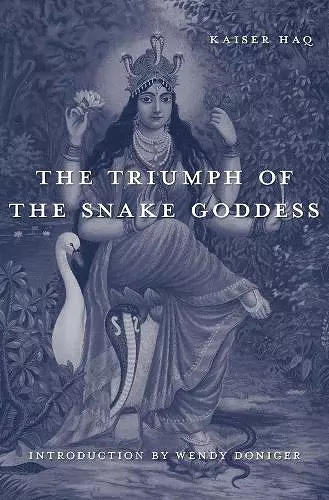The Triumph of the Snake Goddess
Kaiser Haq author Wendy Doniger editor
Format:Hardback
Publisher:Harvard University Press
Published:29th Oct '15
Currently unavailable, and unfortunately no date known when it will be back

Snakes exist in the myths of most societies, often embodying magical, mysterious forces. Snake cults were especially important in eastern India and Bangladesh, where for centuries worshippers of the indigenous snake goddess Manasa resisted the competing religious influences of Indo-Europeans and Muslims. The result was a corpus of verse texts narrating Manasa’s struggle to win universal adoration.
The Triumph of the Snake Goddess is the first comprehensive retelling of this epic tale in modern English. Scholar and poet Kaiser Haq offers a composite prose translation of Manasa’s story, based on five extant versions. Following the tradition of mangalkavyas—Bengali verse narratives celebrating the deeds of deities in order to win their blessings—the tale opens with a creation myth and a synopsis of Indian mythology, zooming in on Manasa, the miraculous child of the god Shiva. Manasa easily wins the allegiance of everyone except the wealthy merchant Chand, who holds fast in his devotion to Shiva despite seeing his sons massacred. A celestial couple is incarnated on earth to fulfill Manasa’s design: Behula, wife to one of Chand’s slain sons, undertakes a harrowing odyssey to restore him to life with Manasa’s help, ultimately persuading Chand to bow to the snake goddess.
A prologue by Haq explores the Bengali oral, poetic, and manuscript traditions behind this Hindu folk epic—a vibrant part of popular Bengali culture, Hindu and Muslim, to this day—and an introduction by Wendy Doniger examines the history and significance of snake worship in classical Sanskrit texts.
Kaiser Haq’s The Triumph of the Snake Goddess is essential reading for all of us who grew up with stories of snakes as objects not just of fear and fascination, but also of veneration, respect, even worship. -- Tabish Khair * The Hindu *
Noteworthy in Haq’s translation are the pleasant descriptive language…and modern vernacular touches… The lengthy introduction (from University of Chicago history of religions professor Wendy Doniger) and prologue are excellent scholarly tools. This book will appeal to students of comparative religion, but can be read with equal enjoyment by laymen in search of engaging storytelling. Even today in South Asia itinerant performers act out the Manasa stories, and women leave out bowls of milk for snakes to pray for fertility. The snake goddess’s triumph is complete. -- Rebecca Foster * Wasafiri *
Both an impeccable scholarly venture and a sparklingly imaginative literary work in its own right, Kaiser Haq’s composite edition—and brilliant translation—of Manasamangal tells the gripping (and frequently hilarious) story of Manasa, the snake-goddess, and the contestation of a minor deity’s rights and privileges by a human. Manasa reminds us of the stubborn immortality of the folk and the non-canonical when faced with the literary and canonical. This is a revelatory, fascinating, and compelling book. -- Neel Mukherjee, author of The Lives of Others
In The Triumph of the Snake Goddess, Haq provides an informative and authoritative introduction to the Manasa traditions of premodern Bengal while creating a highly readable composite narrative of his own. The text is further animated by Doniger’s introduction, which vividly situates the regional particularities of Manasa against the pan-Indian mythic backdrop. -- Brian A. Hatcher, Tufts University
A rendition so rich in detail and so replete with humor that the narrative comes alive again for new readers in unexpected ways. -- Rosinka Chaudhuri * Times Literary Supplement *
ISBN: 9780674365292
Dimensions: unknown
Weight: unknown
368 pages